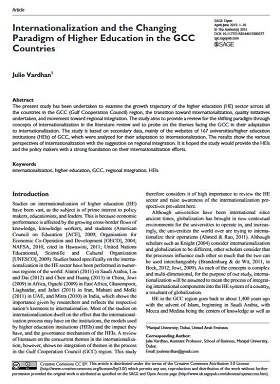Education is an important area of social life, shaping the intellectual and cultural state of society. In the context of globalization, the challenges of time give rise to new trends in it, one of which is internationalization. This process has already swept the whole world, including Arab countries. Some of them, especially the Gulf states, nowadays are actively competing with other exporters of educational services in the world market.
The development paths of higher education in the Arab Gulf countries were analyzed in a scientific article «Internationalization and the Changing Paradigm of Higher Education in the GCC Countries», as well as measures to improve the quality of education and its regional integration. […] In addition to university sites, issues related to the history of the internationalization of education were analyzed, as well as data reflecting demographic trends in the GCC countries. This data allows to see the general picture of how the internationalization of higher education is developing in the Arab States of the Gulf.
Despite some problems, significant progress has been achieved in the internationalization of higher education in the GCC region in a short time. The region has great potential for further internationalization.
The question remains what difficulties the universities of the Arab countries of the region face in such internationalization. In this context, it is interesting to analyze which state initiatives in the field have been successful, and which experiences have not.
Education is an important area of social life, shaping the intellectual and cultural state of society. In the context of globalization, the challenges of time give rise to new trends in it, one of which is internationalization. This process has already swept the whole world, including Arab countries. Some of them, especially the Gulf states, nowadays are actively competing with other exporters of educational services in the world market.
The development paths of higher education in the Arab Gulf countries were analyzed in a scientific article «Internationalization and the Changing Paradigm of Higher Education in the GCC Countries», as well as measures were taken to improve the quality of education and its regional integration. The author of the scientific work is Julie Vardhan, Assistant Professor at the School of Business, Manipal University. The work is based on an analysis of 167 university sites of the countries of the region and some scientific works devoted to the internationalization of higher education, integration, and demographic processes in the GCC countries. The analysis of Julie Vardhan is comprehensive. In addition to university sites, issues related to the history of the internationalization of education were analyzed, as well as data reflecting demographic trends in the GCC countries. These data allow to see the general picture of how the internationalization of higher education is developing in the Arab States of the Gulf.
According to the author’s definition, internationalization is the process of integration of international components into the country's higher education system. Although universities have always developed international cooperation, globalization has created a new context for internationalization. Over the past decades, the number of educational institutions and students studying in them has sharply increased in the region.
Julie Vardhan divides the countries that compete among themselves in the educational services market into four groups. The first group includes the USA, UK, and Australia. In these countries are the best universities in the world, and English is their native language. The second group consists of Germany and France. German and French universities are trying to attract students from neighbouring countries, as well as those countries with which established strong sociocultural and historical ties. The third group includes Japan, Canada, and New Zealand. They attract from 75 thousand to 115 thousand international students per year. The fourth group consists of Malaysia, Singapore, and China. These countries have recently recognized the importance of global education, and now they are spending resources on the development of higher education to compete effectively in the global educational services market. According to the author, the GCC countries are also included in this group.
The main goal of the Gulf Cooperation Council is to develop integration processes and establish cooperation, including in the field of education. At the same time, the GCC countries face some problems associated with the development of advanced technologies. Recently, governments of member states have begun to pay more attention to the development of human capital to ensure sustainable economic growth. Educational and labour migration of knowledge workers directly affects the development of the country's economy, and the Arab Gulf states are just interested in creating a knowledge economy.
For studying the electronic resources of educational institutions, the author used the method of content analysis. In particular, Julie Vardhan ascertained whether internationalization was mentioned on the university’s website by searching for the keywords «international», «global», «international partnerships», «international collaboration», «world-renowned faculty» and «diverse students, multicultural». Only one category is used in the study, in which the words mentioned above and phrases are combined, and it is the «phenomenon of internationalization». As part of the study, 167 university websites of the GCC countries were analyzed. Site analysis was limited to their English versions.
The author made a table that shows the growing trend in the number of universities in the region. Until the 1990s in most GCC countries, there were only one or two state universities. Since the early 2000s, a significant increase concerning the number of both state and private universities has been observed. This boost, according to Julie Vardhan, cannot be explained only by population growth. The focus on the development of human capital played a significant role in increasing the number of universities in the country of the region.
Most GCC countries have public and private institutions that establish partnerships with foreign universities. Besides, some international universities create their branches in the countries of the region. Among the 167 universities examined in this study, 103 educational institutions are private, 70 of them have established partnerships with foreign universities, or are their affiliates. In each of them, internationalization manifests itself in different ways. For example, Saudis often go abroad as part of academic mobility programs. At the same time, many students from other countries come to Saudi Arabia to study the basics of Islam at local universities. Thus, within the framework of internationalization, there are both import and export of education. The UAE and Qatar are states with a considerable number of branches of foreign universities, and the universities of Oman and Kuwait offer many double-degree programs.
One of the reasons for the growing demand for educational services from private universities and those universities that have established partnerships with educational institutions from other countries is the increasing number of youth. Another reason is that the Gulf Arab governments support internationalization and educational integration with other countries and foreign universities. Julie Vardhan outlines the following approaches to the internationalization of higher education, which are used by the governments of GCC member states. The first approach is the implementation of neoliberal reforms aimed at increasing the accessibility of higher education while compensating for the costs of consumers and the private sector. The second approach is to make changes to the curriculum to meet international standards. For example, Saudi Arabia, over the past years, has been trying to develop secular education, actively uses English to educate students, and also adopts the American system of education. The third approach is the establishment of extensive partnerships with foreign universities, affecting the international recognition of the prestige of education in the GCC countries.
The author acknowledges that the study has flaws. There is limited potential for the content analysis method. Julie Vardhan points out that the ability to analyze the content of Internet resources is limited by changing the nature of the data source. The content and structure of web pages can change quite quickly after the content analysis. She also notes that researchers should develop their coding scheme for the content analysis of university sites.
***
Despite some problems (for example, the commodification of education and the transformation of national identity), significant progress has been achieved in the internationalization of higher education in the GCC region in a short time. The region has great potential for further internationalization. The results of the study by Julie Vardhan help to trace the prospects for the internationalization of education in the framework of regional integration of learning. This work is of great scientific interest to anyone interested in the internationalization of higher education in the Gulf countries.
Studying several aspects of the internationalization of education at once prevented the author from concentrating on the electronic internationalization of university Internet resources. The methodology for researching university sites is not spelt out, and it does not specify how exactly the individual stages of content analysis should be implemented. Julie Vardhan believes that researchers should develop their coding scheme, which is the basis of the methodology. It is advisable to create universal and convenient tools for everyone to analyze the content of university sites so that every researcher of the internationalization of higher education can make the maximum contribution to their study. The question remains what difficulties the universities of the Arab countries of the region face in such internationalization. In this context, it is interesting to analyze which state initiatives in the field have been successful, and which experiences have not.






